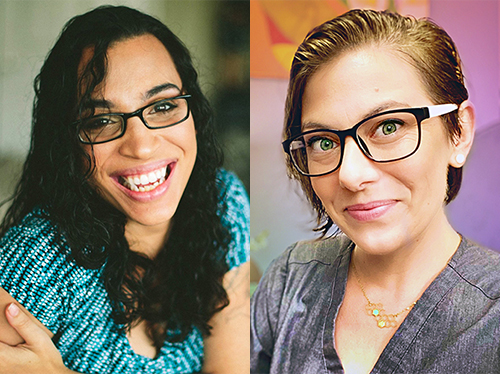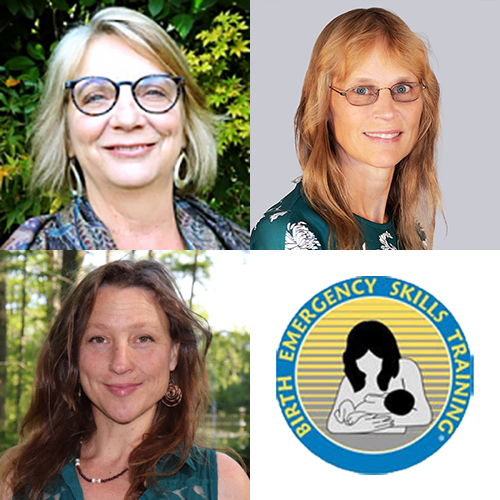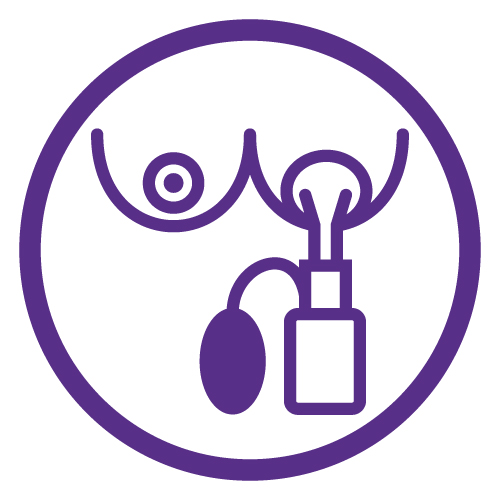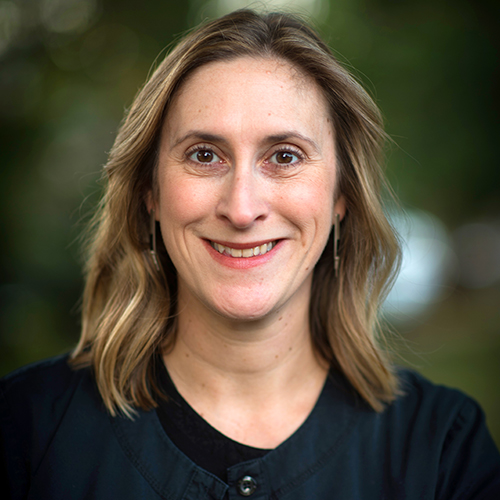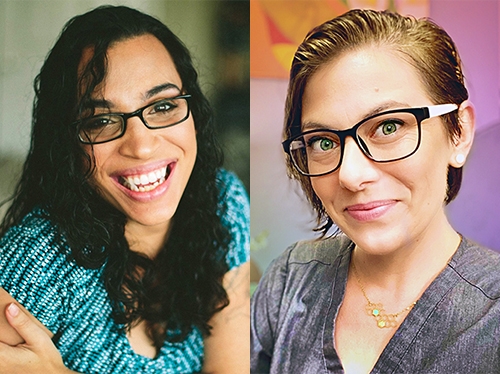

Shondra Mattos is an IBCLC (Internationally Board-certified Lactation Consultant) and owner of a Location-independent lactation practice where she provides breastfeeding and infant feeding support to families countrywide.
Shondra finds the science of lactation fascinating, and as such, she has a passion for sharing her understanding of complex lactation subjects with her colleagues and aspiring lactation students. When she's not with clients, speaking, or teaching, she spends time with her husband and daughter in Fayetteville, NC.
Bryna is a lactation consultant, mentor, educator, and birth doula in the Pacific Northwestern United States. They are active in their community as an advocate for mutual aid, reproductive justice, and reduction in barriers to care. They also own and manage an inclusive private practice. As a member of both Queer and Neurodivergent communities, offering inclusive care on every level is very important to Bryna. Their vision is to offer information and tools to providers to build a community of comprehensive, concordant, and individualized care for all families in the perinatal period.
We propose a talk that outlines the anatomy and physiology of normal infant feeding. Our talk will cover the basic functions of infant muscle groups recruited for latching, sucking, swallowing, and drinking human or artificial milk. We believe that if lactation professionals understand normal physiology as it pertains to muscle groups, they will better be able to educate and help the families our profession serves. At the end of this talk, the lactation professional will be able to establish a baseline for normal muscle function when evaluating the breastfed infant. We will use multiple learning modalities to outline and explain the essentials of muscle function in the breastfed infant.

View Details / Enroll
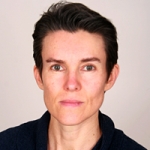
Back to Basics for Cleft Lip and Palate: An Overview of Strategies to Support Lactation in the Neonatal Period and Beyond

Alice Farrow is an IBCLC, writer, speaker, and infant feeding and health equity advocate. Parent of a child born with a cleft lip and palate, Alice has worked extensively, since 2006, with parents, parent organisations, cleft teams health providers and lactation specialists in order to increase awareness of the specific challenges faced by cleft affected infants and their families and to imprve access to adequate lactation support for this community.
Currently based in Rome, Italy, Alice advocates for, and teaches regularly on, the topic of breastfeeding/chestfeeding with an oral cleft via presentations, courses, articles, booklets and handouts and supports parents and professionals wordwide via their Cleft Lip and Palate Breastfeeding website and associated online support group, and in person and distance consultations.
A common misconception among care providers and families is that babies born with an oral cleft cannot breastfeed/chestfeed. This presentation corrects that misconception by exploring cleft types and their expected breastfeeding/chestfeeding outcomes and sharing tools that lactation specialists can use to more effectively support parents when their baby is born with a cleft lip/palate. In particular, during the neonatal period, the lactation specialist is uniquely positioned to support parents to make informed decisions about their feeding choices and create a going home care plan to help them achieve their breastfeeding/chestfeeding goals in the long term.

View Details / Enroll

View Details / Enroll
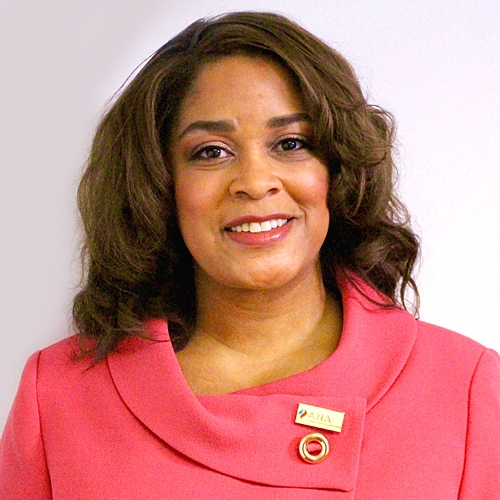
Balancing Beneficence, and Prevention of Harm When Caring for Pregnant Women with Substance Use Disorder

Liz Stokes JD, MA, RN, is the Director of the American Nurses Association Center for Ethics and Human Rights. She completed her BSN at the University of Virginia and worked several years as a critical care nurse. Liz received her Juris Doctor from the University of Richmond and worked as a Consultant for the D.C. Board of Nursing interpreting and conferring professional ethics provisions in nursing. She recently completed her Masters in Bioethics from Loyola University Chicago. Her leadership is also demonstrated through various charitable roles in the health and legal communities. She is a member of The American Association of Nurse Attorneys and serves on the board of the American Society for Bioethics and Humanities Affinity Group for Nursing. Liz also serves as an Associate Editor for the Journal of Bioethical Inquiry and is an active volunteer with the District of Columbia Bar Association. Liz is currently an American Academy of Nursing Jonas Health Policy Scholar.
It is well established that the care of pregnant or postpartum women with substance use disorder(SUD) can be a source of work-related stress for clinicians (Maguire, Webb, Passmore, & Cline, 2012). Providers must balance the ethical principle of beneficence, or preventing harm, with fidelity, which requires fairness, truthfulness, and advocacy (ANA, 2015). This can be a challenge for clinician who are in positions where there is a mandatory requirement to report a pregnant woman’s substance use. In these situations, clinicians must be compassionate, truthful, forthcoming and transparent when communicating obligations with patients to maintain trust in the patient-provider relationship. This discussion will provide recommendations for compassionate care for women with SUD including education on mental health, SUD, interpersonal violence, and treatment options (Hill, 2013). As patient advocates, clinicians can be a strong voice for pregnant women with substance use disorder and their unborn babies (Ferszt, Hickey, & Seleyman, 2013).

View Details / Enroll
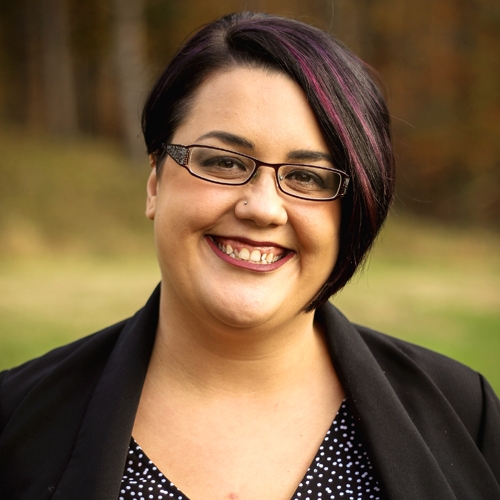
Barriers to Breastfeeding in Appalachia: A Sociocultural Perspective

Stephanie Carroll is an International Board Certified Lactation Consultant (IBCLC) who lives in southeast Ohio with her two daughters. She founded the Appalachian Breastfeeding Network in May of 2016. Now has grown to over 500 members across 15 states. Stephanie owns a private practice and works for a Breast Pump DME part-time. She also works as a speaker and marketing manager for Lactation Education Consultants. She continues to work towards transformation of breastfeeding culture, women's health equity, and increasing access to care in Appalachia, giving a voice to Appalachia, which continues to be underserved and overlooked.
The issue of lower breastfeeding rates in Appalachia goes beyond poverty – as many women in the region are willing to travel out of the area to receive good care. Why isn’t access to care easier to obtain in these rural areas? Why are women getting most of their prenatal education from their family members – making much of the education outdated and incorrect? Why have these women lost trust in their healthcare providers that are local?
The answers to these question reverts back to two major conclusions:
- Women are still considered second class in Appalachia and;
- Many healthcare providers do not understand Appalachian culture in order to serve them in the best way possible.
This presentation will discuss: a. What these specific barriers are; b. How we, as health professionals, can approach these barriers; c. How to help to create a new culture trend; and d. How to empower Appalachian women to take hone of their healthcare – specifically their birth and breastfeeding journey.

View Details / Enroll
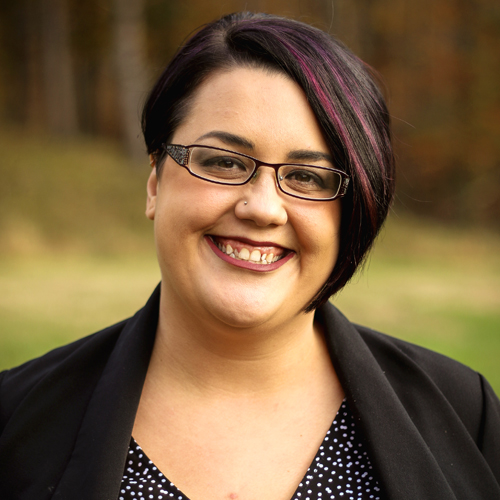
View Details / Enroll
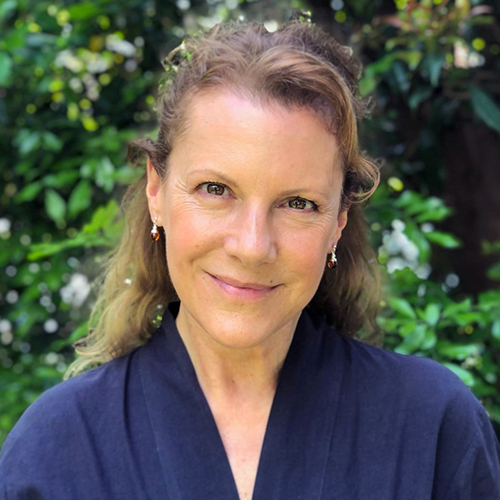
Becoming Parents: Preparing Parents for the Journey of a Lifetime

With over 25 years’ experience as a relationship counsellor, parents’ group facilitator, mental health educator, partner and mum, Elly Taylor has become an internationally known parenthood preparation and perinatal relationship expert and the award-winning author of Becoming Us. Elly’s passion is preparing parents for a happy and healthy family—at any stage in their parenthood journey, and especially in a challenging world. Her Becoming Us approach includes fathers and partners in all aspects of pregnancy, birth and beyond, harnesses the attachment bond between couples to stabilise them through the life changes and challenges of parenthood and links both parents into community services to support the mental, emotional and relational wellbeing of the whole family.
Elly has served as an advisor for numerous university research projects and her ground-breaking Becoming Us developmental framework has now become a comprehensive multi-disciplinary education and professional training and courses for parents. In a full circle moment, Elly recently trained midwives, allied health and therapy professionals in her local community and now Becoming Us Nest Building Sessions are preparing expectant parents in the hospitals where her children were born. Elly lives in Sydney, Australia with her firefighter husband, their three kidults and an abundance of pets.
Topic: Communication and Conflict - How Connection Supports Both - [View Abstract]
Topic: Including Fathers and Partners to Support Perinatal Mental Health and Marriages - [View Abstract]
The “transition” into parenthood is culturally a time of great joy, excitement and celebration. But our “Bon Voyage” attitude to parenthood appears to be setting families up to fail. Research tells us new parents are struggling: currently 1 in 3 mothers and 1 in 5 fathers suffer from anxiety or depression during the perinatal period. Added to this, a whopping 92% of couples report increased conflict and 67% a decline in relationship satisfaction in the first few years of family. So, what’s going on here? Is there a better way? And what can perinatal professionals do about it?
In this presentation, we’ll first bust some unhelpful myths of parenthood. Next, participants will learn that while parents may expect having a baby is the destination, it’s just the beginning. Parenthood is like travelling deeper and deeper into foreign territory: every new stage has it’s own surprises, joys, challenges and unexpected rewards. And the journey never ends.
We’ll explore ways to prepare parents for the stages of early parenthood (even long after their baby has joined them) in ways that support the mental, emotional and relationship wellbeing of mothers, fathers and parents, so their whole family can thrive.
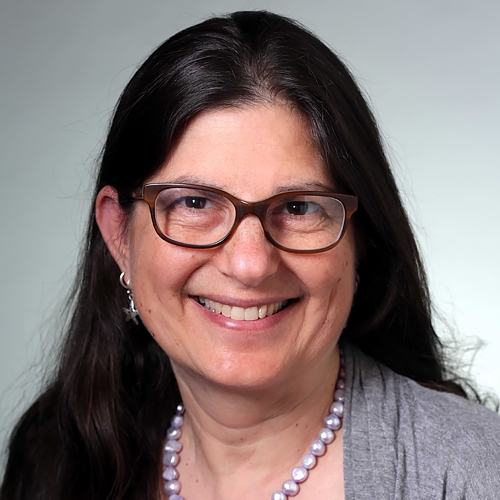

Melissa Bartick, MD, MSc, FABM works as a hospitalist at Mt. Auburn Hospital in Cambridge MA, is an internist and is an Assistant Professor in Medicine at Harvard Medical School. She has numerous breastfeeding publications in peer-reviewed journals. She served as the chair of the Massachusetts Breastfeeding Coalition from 2002 to 2014, where she was also a founder of Ban the Bags. She served on the Board of Directors of the United States Breastfeeding Committee from 2009-2015. She has served on the Board of the Academy of Breastfeeding Medicine since 2019, where she has coauthored clinical protocols, including the 2020 Bedsharing and Breastfeeding protocol. She was founder of the Breastfeeding Forum of the American Public Health Association, where she served two terms as chair. She is founder and co-chair of her state’s Baby-Friendly Hospital Collaborative. She has blog contributions to the Huffington Post, the WBUR CommonHealth Blog, among others. Dr. Bartick received her BA from the University of Virginia and holds an MSc in Health and Medical Sciences from University of California, Berkeley and an MD from University of California, San Francisco. She works as a hospitalist at Mount Auburn Hospital and is the mother of two grown sons. As of June 2020, she is pursuing an MPH at Harvard School of Public Health.
Topic: Missing the Evolutionary Boat: How Viewing Infant Sleep Out of Context Fails Parents and Children - [View Abstract]
Bedsharing promotes breastfeeding, but many authorities recommend against bedsharing for all mothers, citing safety concerns, particularly risk of sudden infant death syndrome or suffocation risks. Here we will review the normal physiology of mother-infant sleep, and the historical context in which such recommendations evolved. In addition, many populations have high rates of bedsharing with low rates of death. In this context, we will review the evidence around bedsharing and the most current evidence-based recommendations. Some risk factors for SIDS are more powerful than others, and we will review the best ways to minimize such risks, including a social-determinants of health approach. In some circumstances, bedsharing may carry particular risks and it is important to be able to discuss these issues with parents without stigma. We will discuss counseling of all parents in the “risk-minimization” approach, which would also allow for promotion of breastfeeding.
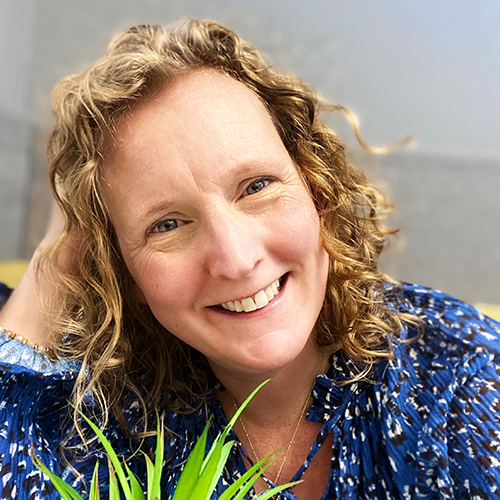
Being Mindful: Case Studies of Mindfulness Tools in Clinical Lactation Practice

Anna Le Grange is an International Board Certified Lactation Consultant, Registered Pediatric Nurse, Mindfulness teacher and Author. She has worked with new families for over 20 years in a variety of clinical roles. Anna brings her passion for psychology, neuroscience and mindfulness into her lactation support work and facilitates other professionals to incorporate emotional well-being tools into their own lactation practice. Mother to 3 children, Anna breastfed her 3rd child following breast reduction surgery and experienced first-hand, the emotional challenges that so often relate to infant feeding complexities. She used her personal experiences alongside mindfulness and lactation knowledge, to create a toolbox of techniques for breastfeeding families, which she includes in her courses and book, The Mindful Breastfeeding Book. Anna believes whole-heartedly in prioritizing calm and connection within our breastfeeding support practices, both for our clients and ourselves. Anna is currently studying for a MSc in Positive Psychology at Buckingham New University and has spoken at various events including the Gold Lactation, ILactation Conference and Nurturing The Future.
Topic: Being Mindful: Case Studies of Mindfulness Tools in Clinical Lactation Practice - [View Abstract]
Topic: Breast/Chestfeeding After Breast Reduction - [View Abstract]
Topic: Working With Anxious Parents and Fussy Babies - [View Abstract]
Bringing self-awareness and self-compassion into our work as healthcare professionals and lactation supporters, enables us to thrive in the work that we do and offer a higher quality and more ethical service to struggling clients. The case studies shared in this presentation offer a unique look at how mindfulness and self-awareness can be used to help navigate the complexities of each case. Learn more about the ways that stress in the feeding parent can impact lactation, how to identify the emotional considerations of a client’s situation, mindful breastfeeding tools and ways that providers can meet their own needs while working on challenging cases.
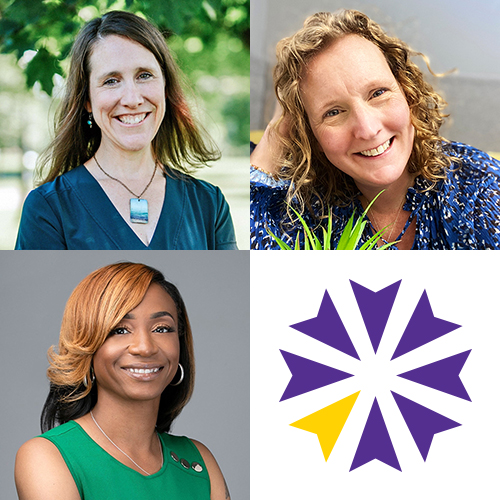
View Details / Enroll

Beneath the Surface: Anatomy and Physiology and How These Influence the Approach to Frenectomy

Justin is a Consultant Paediatrician who has worked in both the UK and Ireland. He has had an interest in Tongue Ties for over 15 years and has created multi-disciplinary pathways of care. He is Medical Director of the National Tongue Tie Centre in County Tipperary, Ireland which he established with Kate Roche, a Chartered Physiotherapist, in 2017. There he and the team provide comprehensive care for infants, children and adults with tethered oral tissues.
The management of tongue tie has many approaches. In this presentation we will explore the anatomy and physiology of normal tongue frenulae and that of ankyloglossia. How the structures affect function and how to manage them to optimise function. We will also discuss the problems that can be seen following incomplete release and reattachment. We will also cover complications during surgery and management options.
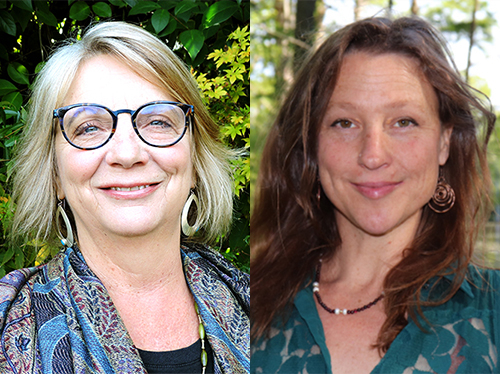

Avril is the founder of the Midwife Method - a midwife-led, supportive and educational online program dedicated to empowering all birthing people who want to experience a conscientious and connected pregnancy, birth and transition into parenthood. Who want to learn to thrive in body, mind and spirit and not only feel prepared and informed every step of the way...but loved, supported and guided throughout. This incredible resource is available for busy midwives to count on, to provide for all the educational needs of their clients to have a healthy, joyful and empowering pregnancy, birth and smooth transition into parenthood.
For the past four years, she has loved being an instructor and office manager with Birth Emergency Skills Training® (B.E.S.T.), as well as co-developer of the Online and Hybrid programs. B.E.S.T. is dedicated to improving maternal and fetal outcomes by helping midwives effectively, efficiently, competently and confidently manage emergencies when they arise.
She has been intimately woven into the fabric of serving birthing families since 1998 working at home and in birth centers. Together with her partner, she has home-birthed, home-schooled and raised 3 incredible human beings (18, 24 and 26)!
With an unquenchable thirst for knowledge and desire to support a broader population in attaining their health goals, she returned to school, completing a Bachelor of Science in nursing in 2016, then pursued a Family Nurse Practitioner degree at Georgetown University which she was unable to complete due to unforeseen circumstances.
Andrea Dixon, CNM, reveled in birth from an early age, a maternal great aunt (a London homebirth midwife) her inspiration. From NAPSAC in Ann Arbor, MI, apprenticeship in Boulder, CO and graduating CNM from UCSF in 1987, Andrea covered all the bases in midwifery. The sole proprietor of Family Way Educational Services, Weed, CA 1988-Present she has home-birthed families in the largest geographical county in northern California, managed a midwife service for Redding Birth Center, served a hospital-based population in the USVI, WomanCare, in MO and homebirth, birth centers (3) and hospital practices throughout Indiana. Andrea is a long-time instructor of out-of-hospital specific NRP. She developed live B.E.S.T. (Birth Emergency Skills Training) workshops for out of hospital providers, and subsequently, in partnership with Avril Bowens, CPM, HYBRID and ONLINE BEST courses based on Bonnie Urguhart Gruenberg's award winning publication. Homebirth, homeschooling her daughter (now 33 and presently at the CDC), and a midwifery friendly partner of 38 years, have enhanced her life.
Hypertension and its pregnancy-related disorders are a leading cause of preterm birth, fetal growth restriction and a multitude of emergencies. Despite modern advancements in maternity care globally, hypertensive disorders of pregnancy remain at the root of appalling morbidity and mortality statistics. Birth Emergency Skills Training® and GOLD Learning have partnered to present an in-depth examination of these often insidious, yet potentially lethal conditions. It is imperative that all community centered birth workers learn to recognize and respond to these disorders as they develop. Based on the latest research about risks, clinical manifestations, long-term health implications, and effects of COVID-19 on pregnancy, this program includes best practice guidelines and client centered educational resources. Join us and discover how you can play a role in the blueprint addressing this ongoing health crisis.

Beyond Fenugreek: An Individualized Approach to Dietary and Herbal Galactagogues

Melissa Cole, MS, IBCLC, RLC is a board certified lactation consultant, neonatal oral-motor assessment professional, and clinical herbalist in private practice. Melissa has been passionate about providing comprehensive, holistic lactation support and improving the level of clinical lactation skills for health professionals. She enjoys teaching, researching and writing about wellness and lactation-related topics. Melissa holds a bachelor of science degree in maternal child health and lactation consulting and her master’s work is in therapeutic, clinical herbalism. Melissa actively conducts research and collaborates with several lactation and health care professional associations. Before pursuing her current path, Melissa’s background was in education and cultural arts, which has served her well in her work as a lactation consultant and healthcare educator. She loves living, working and playing in the beautiful Pacific Northwest with her 3 children.
Topic: Beyond Fenugreek: An Individualized Approach to Dietary and Herbal Galactagogues - [View Abstract]
Topic: Beyond the Basics of Latch: Support Strategies for Helping Babies when the Basics Aren’t Enough - [View Abstract]
Topic: Common Infant Digestive Health Concerns and Useful Support Strategies - [View Abstract]
Topic: Connection and Care: Virtual Support for Tongue-Tied Infants - [View Abstract]
Topic: Feeding is Movement: Activities for Supporting Optimal Infant Oral Function - [View Abstract]
Topic: Infant Gut Health: Common Concerns and Useful Support Strategies - [View Abstract]
Topic: Infant Oral Assessment: Exploring Anatomy and Function Beyond the Frenulum - [View Abstract]
Topic: Low Milk Production Detective Work: Assessment and Care Plan Considerations - [View Abstract]
Topic: Nature’s Nurturers: Plant Medicine for Perinatal Mental Health - [View Abstract]
Topic: New Thoughts on Infant Pre and Post-Frenotomy Care - [View Abstract]
Topic: Placenta Medicine as a Galactogogue: Tradition or Trend? - [View Abstract]
Topic: Thinking Critically About the Use of Clinical Lactation Tools - [View Abstract]
Topic: Will It Hurt? Frenotomy Aftercare Strategies to Optimize Healing Outcomes for the Newborn - [View Abstract]
While some clinicians might roll their eyes when ‘lactation cookies’ are mentioned we know foods and herbs have long been used to nourish the postpartum parent and enhance lactation. Some topics this talk aims to cover: Does nourishment matter when it comes to breastmilk quality or quantity? How can we approach galactogogues for lactating mothers in an individualized way? How can clinicians evaluate evidence and determine safety regarding galactogogues? We know that parent coping with milk supply concerns are often desperate to ‘try anything’. Clinicians have an important role in helping families understand the risks and benefits of galactogogues. By helping parents identify resources and information around foods and herbs, we can help empower them to make informed choices.




